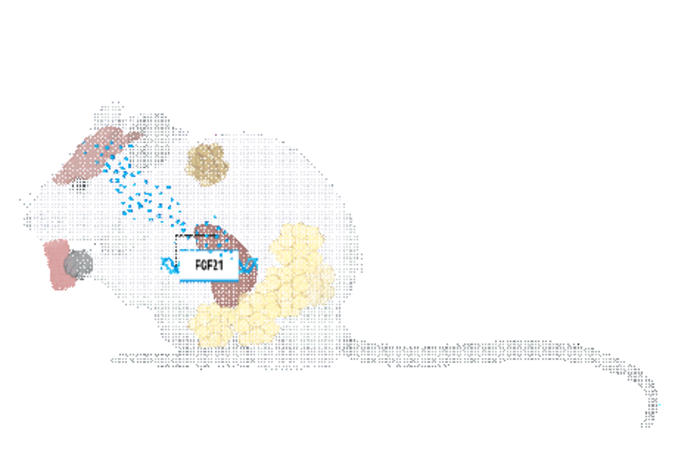BATON ROUGE, LA. – A single hormone appears to coordinate the lifespan extension produced by a low-protein diet.

Credit: Pennington Biomedical Research Center
BATON ROUGE, LA. – A single hormone appears to coordinate the lifespan extension produced by a low-protein diet.
A new study from Pennington Biomedical Research Center, published in the journal Nature Communications, found that reducing the amount of protein in the diet produced an array of favorable health outcomes, including an extension of lifespan, and that these effects depend on a liver-derived metabolic hormone called Fibroblast Growth Factor 21 (FGF21).
It has long been known that reducing the amount you eat improves health and extends lifespan, and there has been increasing interest in the possibility that reducing protein or amino acid intake contributes to this beneficial effect. Several recent studies suggest that diets that are low in protein, but not so low that they produce malnutrition, can improve health. Conversely, overconsumption of high-protein diets has been linked to increased mortality in certain age groups.
A few years ago, Pennington Biomedical’s Neurosignaling Laboratory discovered that the metabolic hormone FGF21 was a key signal linking the body to the brain during protein restriction. Without this signal, young mice failed to change their feeding behavior or metabolism when placed on a low-protein diet.
“Our data suggest that FGF21 talks to the brain, and that without this signal the mouse doesn’t ‘know’ that it is eating a low-protein diet. As a result, the mouse fails to adaptively change its metabolism or feeding behavior,” said Christopher Morrison, Ph.D., Professor and Director of the Neurosignaling Lab.
The group’s newest work, led by postdoctoral researcher Cristal M. Hill, Ph.D., demonstrates that low-protein diets produce beneficial metabolic effects in aged mice, improving metabolic health, reducing frailty, and extending lifespan. These beneficial effects were also apparent when protein intake was reduced in middle-aged mice, even protecting against the detriments of obesity. Importantly, these beneficial effects were lost in mice that lacked FGF21, suggesting that its action in the brain is critical for the increase in health and lifespan.
“We previously showed that FGF21 acts in the brain to improve metabolic health in young mice fed a low-protein diet. These new data extend this work by demonstrating that FGF21 also improves metabolic health and extends lifespan. Collectively, these data provide clear evidence that FGF21 is the first known hormone that coordinates feeding behavior and metabolic health to improve lifespan during protein restriction,” Dr. Hill said.
However, Dr. Hill said several questions remain. It’s unclear exactly how these observations will translate to aging humans, but the hope is that this work will uncover novel molecular and neural pathways that can be leveraged to improve health in people.
“This groundbreaking research has important implications for extending the health and lifespan of people. If scientists can better understand how diets and nutritional hormones like FGF21 act to extend lifespan, these discoveries could offset many of the health issues that occur in middle age and later,” said Pennington Biomedical Executive Director John Kirwan, Ph.D.
This work was supported by the National Institutes of Health grants R01DK105032, R01DK121370, R01DK123083, and F32DK115137. The content is solely the responsibility of the authors and does not necessarily represent the official views of the National Institutes of Health.
###
About LSU’s Pennington Biomedical Research Center
The Pennington Biomedical Research Center is at the forefront of medical discovery as it relates to understanding the triggers of obesity, diabetes, cardiovascular disease, cancer and dementia. The Center architected the “Obecity, USA” awareness and advocacy campaign to help solve the obesity epidemic by 2040. The Center conducts basic, clinical, and population research, and is affiliated with Louisiana State University. The research enterprise at Pennington Biomedical includes over 480 employees within a network of 40 clinics and research laboratories, and 13 highly specialized core service facilities. Its scientists and physician/scientists are supported by research trainees, lab technicians, nurses, dietitians, and other support personnel. Pennington Biomedical is located in state-of-the-art research facilities on a 222-acre campus in Baton Rouge, Louisiana. For more information, see https://www.pbrc.edu .
Journal
Nature Communications
DOI
10.1038/s41467-022-29499-8
Method of Research
Experimental study
Subject of Research
Animals
Article Title
FGF21 is required for protein restriction to extend lifespan and improve metabolic health in male mice
Article Publication Date
7-Apr-2022
COI Statement
None




